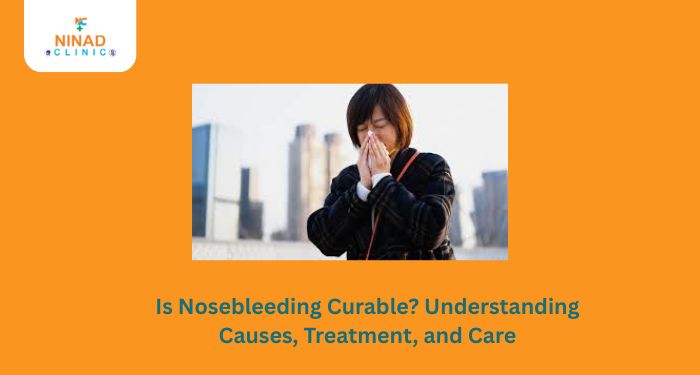Nosebleeding, medically called epistaxis, is a common condition that can be alarming but is usually not serious. Most nosebleeds are temporary and can be managed at home, while some require medical attention. The good news is that nosebleeding is curable in most cases, especially when the underlying cause is identified and treated correctly.
If you or your family members experience frequent or severe nosebleeds, consulting an Ear Specialist in Pimple Nilakh can help ensure proper diagnosis and treatment.
Why Do Nosebleeds Happen?
The inner lining of our nose is rich in blood vessels, making it delicate and prone to bleeding. Even a small trigger can cause a vessel to rupture. The most common reasons for nosebleeds include:
-
Dry air and climate changes: Dryness makes the nasal lining crack, leading to bleeding.
-
Frequent nose-picking or injury: A direct blow or habit of picking the nose can rupture small vessels.
-
Allergies and infections: Sinus infections or allergies may irritate the nasal passages.
-
High blood pressure: Increased pressure can make fragile blood vessels burst.
-
Medications: Blood thinners or nasal sprays can increase the risk of nosebleeds.
-
Underlying conditions: Rarely, bleeding disorders or nasal growths may be responsible.
Types of Nosebleeds
-
Anterior Nosebleeds:
These are the most common, where bleeding starts from the front part of the nose. They are usually mild and can be controlled easily. -
Posterior Nosebleeds:
Less common but more serious, these occur deeper inside the nose and may require medical attention.
Are Nosebleeds Curable?
Yes, in most cases, nosebleeds are completely curable. Once the cause is identified, treatment becomes straightforward. For instance, if the bleeding is due to dryness, using a humidifier or nasal ointment may solve the problem. If caused by high blood pressure, managing blood pressure helps prevent recurrence.
An Ent Specialist in Pimple Nilakh can diagnose whether your nosebleeds are minor or linked to a medical condition that needs treatment.
Immediate First Aid for Nosebleeds
If you or someone around you experiences a nosebleed, here’s what to do:
-
Sit upright and lean slightly forward (do not lie down).
-
Pinch the soft part of the nose firmly for 10–15 minutes.
-
Breathe through your mouth and stay calm.
-
Apply a cold compress on the nose bridge to reduce blood flow.
-
Avoid blowing or picking your nose for several hours after the bleeding stops.
If bleeding doesn’t stop within 20 minutes, or if it is very heavy, seek medical care immediately.
Medical Treatment for Nosebleeds
An Ent Specialist in Pimple Nilakh may suggest the following treatments depending on the cause:
-
Nasal Packing: Soft gauze or medicated packing to stop bleeding.
-
Cauterization: Sealing the bleeding vessel with a chemical or electrical device.
-
Medication Adjustment: If blood thinners are the cause, your doctor may modify dosage with proper advice.
-
Surgery: Rarely, in severe or recurrent cases, surgical intervention may be needed.
Preventing Nosebleeds
Prevention plays an important role in controlling recurring nosebleeds. Here are some simple tips:
-
Keep the nasal passages moist with saline sprays or gels.
-
Use a humidifier at home, especially in dry weather.
-
Avoid excessive nose-picking or forceful blowing.
-
Limit alcohol and smoking, as they dry and irritate the nasal lining.
-
Stay hydrated and eat a balanced diet.
-
Control blood pressure with regular check-ups.
When to See an Ear Specialist in Pimple Nilakh
While occasional mild nosebleeds are common, you should seek medical help if:
-
Nosebleeds occur frequently.
-
Bleeding is heavy or difficult to stop.
-
Nosebleeds are accompanied by dizziness, weakness, or fainting.
-
You have other symptoms like blocked nose, sinus pain, or unexplained bruising.
-
You are on blood-thinning medications.
An Ent Specialist in Pimple Nilakh can examine your nasal passages, identify the exact cause, and recommend the right treatment for long-term relief.
Conclusion
Nosebleeding can seem scary, but it is usually curable and not a sign of a serious health problem. With proper first aid, medical care, and preventive steps, you can manage and even stop nosebleeds from recurring. If you or your loved ones face frequent episodes, don’t ignore them—consult an experienced Ent Specialist in Pimple Nilakh to ensure safe and effective treatment.

